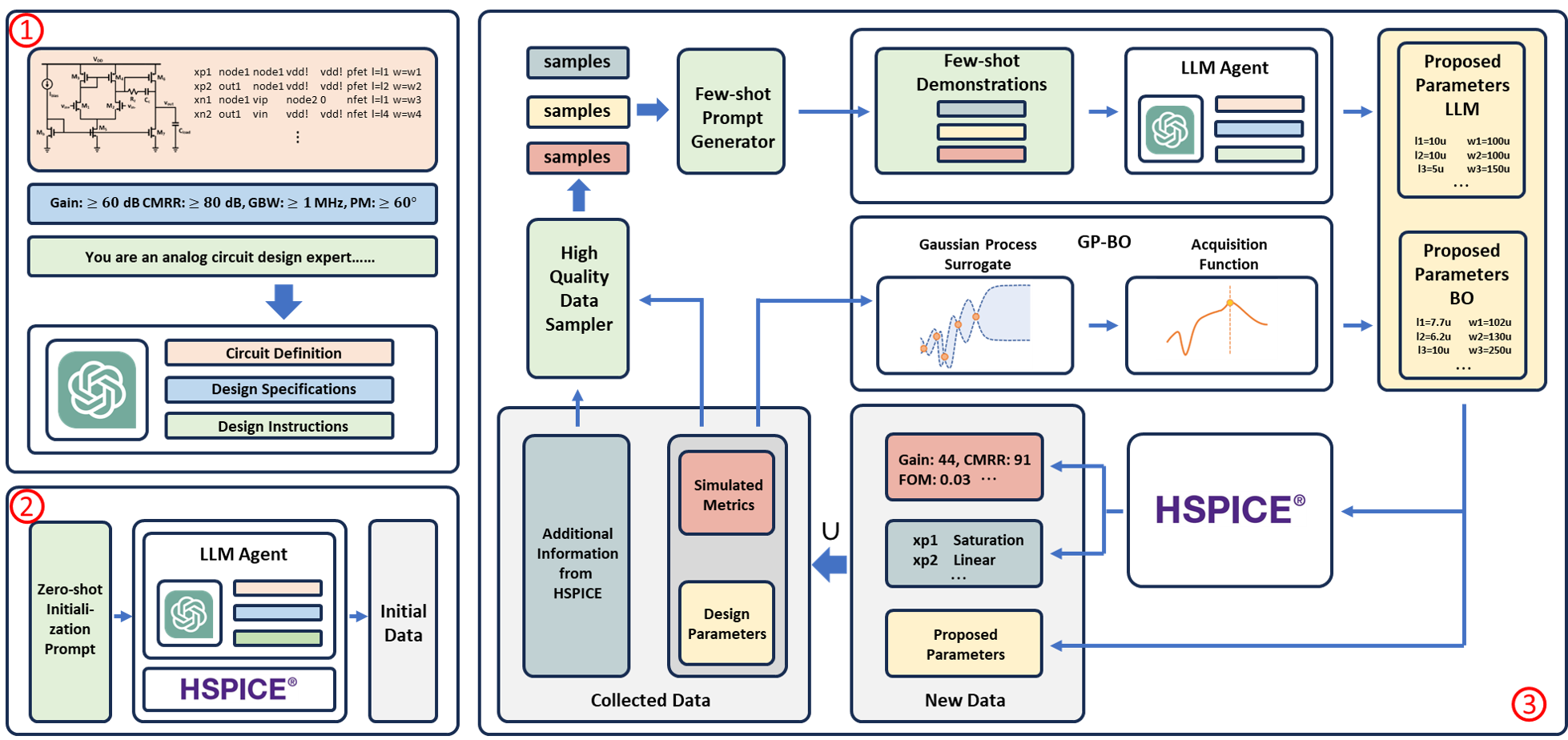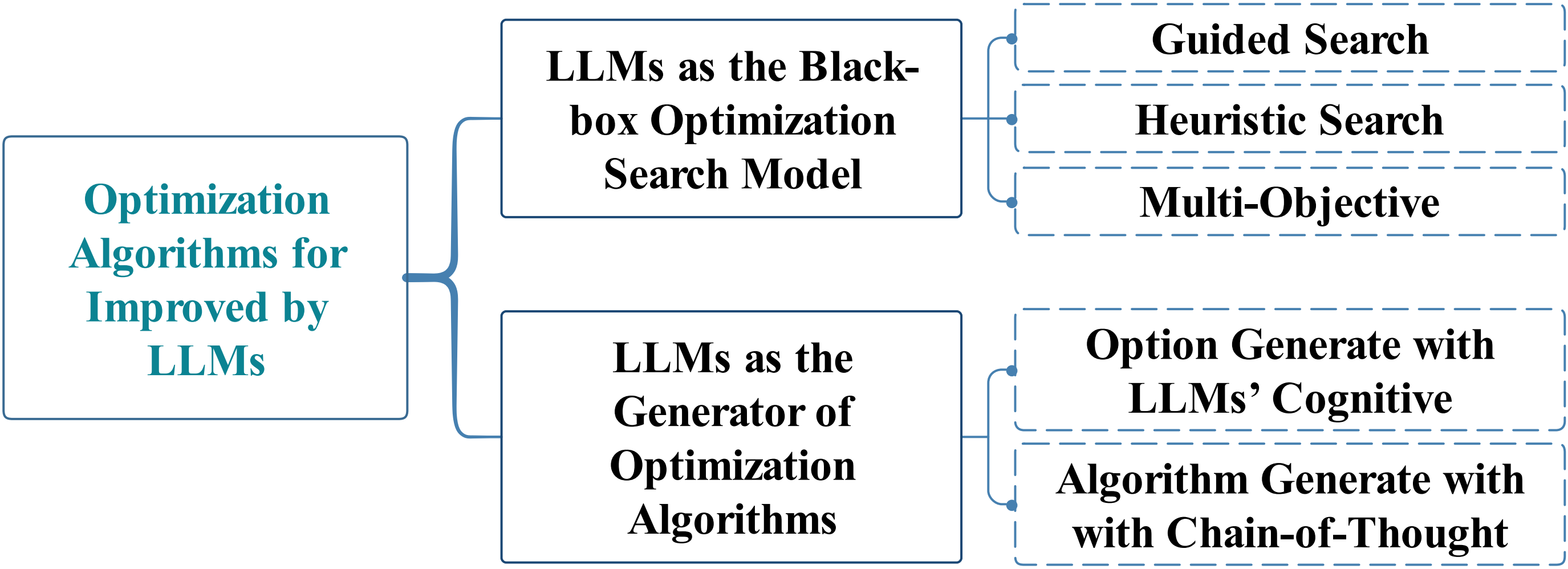ADO-LLM: Analog Design Bayesian Optimization with In-Context Learning of Large Language Models
2406.18770

0
0

Abstract
Analog circuit design requires substantial human expertise and involvement, which is a significant roadblock to design productivity. Bayesian Optimization (BO), a popular machine learning based optimization strategy, has been leveraged to automate analog design given its applicability across various circuit topologies and technologies. Traditional BO methods employ black box Gaussian Process surrogate models and optimized labeled data queries to find optimization solutions by trading off between exploration and exploitation. However, the search for the optimal design solution in BO can be expensive from both a computational and data usage point of view, particularly for high dimensional optimization problems. This paper presents ADO-LLM, the first work integrating large language models (LLMs) with Bayesian Optimization for analog design optimization. ADO-LLM leverages the LLM's ability to infuse domain knowledge to rapidly generate viable design points to remedy BO's inefficiency in finding high value design areas specifically under the limited design space coverage of the BO's probabilistic surrogate model. In the meantime, sampling of design points evaluated in the iterative BO process provides quality demonstrations for the LLM to generate high quality design points while leveraging infused broad design knowledge. Furthermore, the diversity brought by BO's exploration enriches the contextual understanding of the LLM and allows it to more broadly search in the design space and prevent repetitive and redundant suggestions. We evaluate the proposed framework on two different types of analog circuits and demonstrate notable improvements in design efficiency and effectiveness.
Create account to get full access
Overview
- This paper presents "ADO-LLM", a method that combines Bayesian optimization with large language models (LLMs) for efficient analog circuit design.
- The key idea is to use LLMs to learn from previous design experiences and guide the Bayesian optimization process, leading to faster convergence on optimal circuit designs.
- The authors demonstrate the effectiveness of ADO-LLM on several analog circuit design tasks, showing significant improvements in optimization speed and quality compared to traditional methods.
Plain English Explanation
The paper describes a new technique called "ADO-LLM" that uses large language models to help design analog circuits more efficiently. Analog circuits are electronic components that work with continuous signals, like those used in audio equipment or sensors.
Designing these circuits can be very challenging, as there are many parameters to optimize to get the best performance. The researchers developed a way to have a language model learn from past successful circuit designs. This knowledge is then used to guide a powerful optimization technique called Bayesian optimization, helping it converge on the optimal circuit design much faster than traditional methods.
The key innovation is combining the flexibility and learning capabilities of large language models with the optimization power of Bayesian methods. This allows the system to intelligently explore the design space and zero in on the best solutions, saving time and effort compared to manual or brute-force circuit design.
Technical Explanation
The paper introduces the "ADO-LLM" framework, which integrates large language models into a Bayesian optimization approach for efficient analog circuit design.
The core idea is to leverage the ability of LLMs to learn patterns and relationships from a corpus of successful circuit designs. This "in-context learning" capability is then used to guide the Bayesian optimization process, helping it navigate the complex design space more effectively.
Specifically, the authors propose a two-stage framework:
-
LLM-based feature extraction: A pre-trained LLM is used to encode the circuit design parameters into a high-dimensional feature representation. This captures the semantic relationships between the design variables.
-
Bayesian optimization with LLM guidance: The LLM-encoded features are used to define the objective function and acquisition function for the Bayesian optimization algorithm. This allows the optimization to exploit the learned design knowledge from the LLM.
The authors evaluate ADO-LLM on several analog circuit design tasks, including op-amp, bandpass filter, and low-noise amplifier design. The results show that ADO-LLM outperforms traditional Bayesian optimization and other baselines in terms of optimization speed and quality of the final designs.
Critical Analysis
The paper presents a promising approach to leveraging the strengths of large language models and Bayesian optimization for analog circuit design. However, there are a few considerations:
-
Scalability: While the results are strong on the tested circuits, it's unclear how well ADO-LLM would scale to more complex, higher-dimensional analog design problems. The authors may need to further investigate the limits of the method.
-
Interpretability: As with many LLM-based approaches, the inner workings of the system may be difficult to interpret. This could pose challenges for circuit designers who prefer more transparent optimization methods.
-
Generalization: The paper focuses on demonstrating ADO-LLM on specific circuit design tasks. Further research is needed to assess how well the technique generalizes to a broader range of analog design problems.
-
Data requirements: The performance of the LLM-based feature extraction likely depends on the availability of a sufficiently large and diverse corpus of past circuit designs. Obtaining such datasets may be a practical challenge in some domains.
Overall, the ADO-LLM framework represents an exciting step towards more efficient and intelligent analog circuit design. Continued research to address the above limitations could further enhance the practical applicability of this approach.
Conclusion
This paper presents a novel method called "ADO-LLM" that combines large language models and Bayesian optimization for efficient analog circuit design. By leveraging the in-context learning capabilities of LLMs, the technique is able to guide the optimization process and converge on high-performing circuit designs much faster than traditional approaches.
The results demonstrate the power of integrating advanced machine learning techniques like LLMs with traditional optimization methods. This work paves the way for more intelligent and automated analog design tools, which could significantly accelerate the development of analog electronics across a wide range of applications.
While there are some limitations to address, the ADO-LLM framework represents an important contribution to the field of analog circuit design optimization. As large language models continue to advance, integrating them into design workflows like this could become an increasingly valuable strategy.
This summary was produced with help from an AI and may contain inaccuracies - check out the links to read the original source documents!
Related Papers

LLM-Enhanced Bayesian Optimization for Efficient Analog Layout Constraint Generation
Guojin Chen, Keren Zhu, Seunggeun Kim, Hanqing Zhu, Yao Lai, Bei Yu, David Z. Pan

0
0
Analog layout synthesis faces significant challenges due to its dependence on manual processes, considerable time requirements, and performance instability. Current Bayesian Optimization (BO)-based techniques for analog layout synthesis, despite their potential for automation, suffer from slow convergence and extensive data needs, limiting their practical application. This paper presents the texttt{LLANA} framework, a novel approach that leverages Large Language Models (LLMs) to enhance BO by exploiting the few-shot learning abilities of LLMs for more efficient generation of analog design-dependent parameter constraints. Experimental results demonstrate that texttt{LLANA} not only achieves performance comparable to state-of-the-art (SOTA) BO methods but also enables a more effective exploration of the analog circuit design space, thanks to LLM's superior contextual understanding and learning efficiency. The code is available at https://github.com/dekura/LLANA.
6/21/2024
🛠️
A Sober Look at LLMs for Material Discovery: Are They Actually Good for Bayesian Optimization Over Molecules?
Agustinus Kristiadi, Felix Strieth-Kalthoff, Marta Skreta, Pascal Poupart, Al'an Aspuru-Guzik, Geoff Pleiss

0
0
Automation is one of the cornerstones of contemporary material discovery. Bayesian optimization (BO) is an essential part of such workflows, enabling scientists to leverage prior domain knowledge into efficient exploration of a large molecular space. While such prior knowledge can take many forms, there has been significant fanfare around the ancillary scientific knowledge encapsulated in large language models (LLMs). However, existing work thus far has only explored LLMs for heuristic materials searches. Indeed, recent work obtains the uncertainty estimate -- an integral part of BO -- from point-estimated, non-Bayesian LLMs. In this work, we study the question of whether LLMs are actually useful to accelerate principled Bayesian optimization in the molecular space. We take a sober, dispassionate stance in answering this question. This is done by carefully (i) viewing LLMs as fixed feature extractors for standard but principled BO surrogate models and by (ii) leveraging parameter-efficient finetuning methods and Bayesian neural networks to obtain the posterior of the LLM surrogate. Our extensive experiments with real-world chemistry problems show that LLMs can be useful for BO over molecules, but only if they have been pretrained or finetuned with domain-specific data.
5/30/2024

Machine Learning Driven Global Optimisation Framework for Analog Circuit Design
Ria Rashid, Komala Krishna, Clint Pazhayidam George, Nandakumar Nambath

0
0
We propose a machine learning-driven optimisation framework for analog circuit design in this paper. The primary objective is to determine the device sizes for the optimal performance of analog circuits for a given set of specifications. Our methodology entails employing machine learning models and spice simulations to direct the optimisation algorithm towards achieving the optimal design for analog circuits. Machine learning based global offline surrogate models, with the circuit design parameters as the input, are built in the design space for the analog circuits under study and is used to guide the optimisation algorithm, resulting in faster convergence and a reduced number of spice simulations. Multi-layer perceptron and random forest regressors are employed to predict the required design specifications of the analog circuit. Since the saturation condition of transistors is vital in the proper working of analog circuits, multi-layer perceptron classifiers are used to predict the saturation condition of each transistor in the circuit. The feasibility of the candidate solutions is verified using machine learning models before invoking spice simulations. We validate the proposed framework using three circuit topologies--a bandgap reference, a folded cascode operational amplifier, and a two-stage operational amplifier. The simulation results show better optimum values and lower standard deviations for fitness functions after convergence. Incorporating the machine learning-based predictions proposed in the optimisation method has resulted in the reduction of spice calls by 56%, 59%, and 83% when compared with standard approaches in the three test cases considered in the study.
4/5/2024

When Large Language Model Meets Optimization
Sen Huang, Kaixiang Yang, Sheng Qi, Rui Wang

0
0
Optimization algorithms and large language models (LLMs) enhance decision-making in dynamic environments by integrating artificial intelligence with traditional techniques. LLMs, with extensive domain knowledge, facilitate intelligent modeling and strategic decision-making in optimization, while optimization algorithms refine LLM architectures and output quality. This synergy offers novel approaches for advancing general AI, addressing both the computational challenges of complex problems and the application of LLMs in practical scenarios. This review outlines the progress and potential of combining LLMs with optimization algorithms, providing insights for future research directions.
5/17/2024